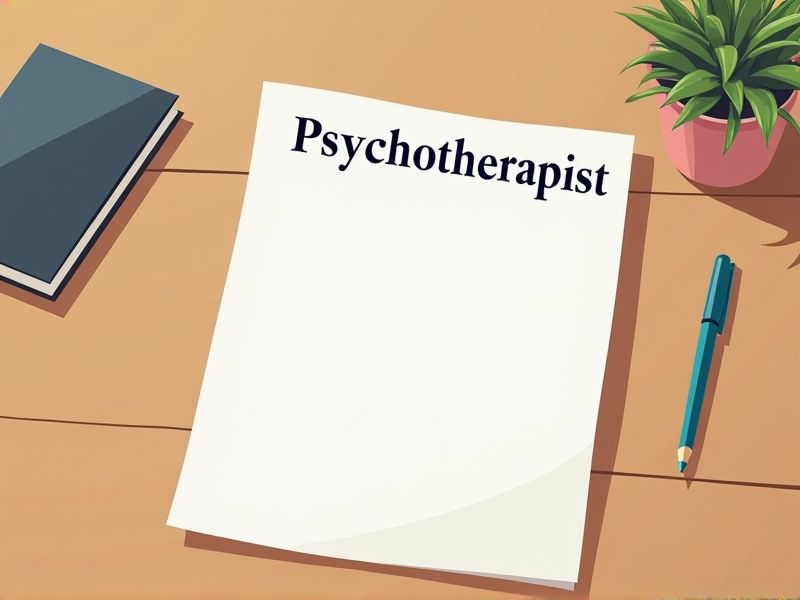
Becoming a psychotherapist involves more than just a passion for helping others; it requires a solid foundation of professional training and credentials to ensure ethical and effective practice. Specific certifications play a critical role in establishing a therapist's credibility, enhancing their knowledge, and granting them the legal authority to treat clients. These certifications ensure that therapists adhere to industry standards and continuously update their skills to address diverse patient needs. Here are essential certifications that aspiring psychotherapists often pursue.
Licensed Professional Counselor (LPC)
The need for a Licensed Professional Counselor (LPC) arises due to their extensive training in providing therapy, addressing various mental health issues effectively. LPCs are equipped with the skills to create tailored treatment plans, which enhance client outcomes. Their licensure ensures adherence to ethical guidelines, fostering trust and safety in the therapeutic relationship. By meeting state-specific requirements, they demonstrate a high standard of competence and knowledge in psychotherapeutic practices.
Licensed Clinical Social Worker (LCSW)
Licensed Clinical Social Workers (LCSWs) provide essential mental health services, addressing the increasing demand for psychotherapy due to rising mental health issues globally. They possess specialized training in both therapy and social work, enabling them to address a wide range of psychological, social, and environmental factors impacting clients. LCSWs are qualified to diagnose mental health disorders and develop treatment plans, ensuring comprehensive care. Their expertise in navigating medical, social, and community resources enhances coordination and continuity of care for clients.
Registered Mental Health Counselor (LMHC)
Registered Mental Health Counselors (LMHCs) provide essential clinical oversight, ensuring that psychotherapists adhere to professional standards and ethical guidelines. They bring a depth of understanding in diagnosing and treating various mental health conditions, enhancing therapeutic efficacy. Their training allows them to incorporate evidence-based practices, which improves patient outcomes. LMHCs also foster a collaborative environment for continued learning and professional development within psychotherapy.
National Certified Counselor (NCC)
Earning the National Certified Counselor (NCC) credential increases a psychotherapist's credibility by demonstrating adherence to high standards in counseling practice. This certification promotes ethical behavior since it requires adherence to the NBCC's Code of Ethics. It offers a psychotherapist access to continued professional development and educational resources, which enhances their competency over time. With the NCC designation, psychotherapists can potentially expand their practice opportunities in various settings, as some employers prefer or require this certification.
Certified Clinical Mental Health Counselor (CCMHC)
The CCMHC credential demonstrates that a psychotherapist has met advanced standards in clinical mental health practice, which builds trust with clients and stakeholders. Specialized CCMHC training enhances a psychotherapist's ability to address complex mental health issues effectively. By obtaining the CCMHC credential, therapists signify their commitment to continuing education and professional growth. This certification helps distinguish qualified practitioners in an increasingly competitive field, improving career prospects.
Certified Addictions Counselor (CAC)
A Certified Addictions Counselor (CAC) is essential for psychotherapists because specialized knowledge in addiction facilitates more effective treatment plans for patients dealing with substance abuse. The CAC's expertise in recognizing addiction patterns contributes to early intervention and prevention strategies, enhancing therapeutic outcomes. The presence of a CAC provides psychotherapists comprehensive support in addressing both the psychological aspects and specific addiction-related challenges. The collaboration between psychotherapists and CACs enriches the therapeutic process by integrating multidisciplinary perspectives, crucial for holistic patient care.
Board Certified Behavior Analyst (BCBA)
Psychotherapists often encounter clients with behavioral challenges that require specialized intervention, which a BCBA can provide through evidence-based practices. The structured approach used by a BCBA can enhance treatment effectiveness by closely analyzing and modifying behavior patterns. Collaboration with a BCBA ensures that treatment plans are individualized and grounded in data-driven strategies. The integration of BCBA insights can lead to improved outcomes in behavior modification and mental health therapy.
Certified EMDR Therapist (CEMDT)
The designation of Certified EMDR Therapist (CEMDT) ensures that a psychotherapist has undergone specific training and demonstrated proficiency in Eye Movement Desensitization and Reprocessing therapy. This specialized training enhances the therapist's ability to effectively address trauma and related psychological issues, improving treatment outcomes for clients. Rigorously vetted credentials increase a psychotherapist's credibility and trustworthiness, attracting clients seeking skilled and knowledgeable practitioners. The demand for certified EMDR therapists rises as more research supports EMDR's effectiveness in reducing symptoms of PTSD and trauma-related disorders.
Registered Play Therapist (RPT)
An RPT enhances therapeutic outcomes by using play as a natural communication method, especially effective for children who struggle to articulate their feelings verbally. It signifies specialized training in therapeutic play techniques, ensuring a high standard of care in addressing developmental and emotional issues. With this expertise, RPTs can interpret play interactions to uncover underlying psychological concerns that might be missed in traditional therapy settings. Techniques employed by RPTs can foster trust and facilitate a safer environment for children to express and process complex emotions.
Certified Somatic Experiencing Practitioner (SEP)
Psychotherapists benefit from becoming Certified Somatic Experiencing Practitioners as it provides them with specialized skills to address trauma stored in the body. This certification enables them to integrate body-focused therapies, enhancing the effectiveness of traditional talk therapy in trauma recovery. Somatic Experiencing techniques reduce symptoms of discomfort and empower clients to process trauma more holistically. Psychotherapists with SEP credentials can cater to a broader client base with diverse mental health needs, improving overall treatment outcomes.
Summary
When you obtain certifications as a psychotherapist, your credibility among clients and peers increases, leading to potentially higher client retention rates. Certifications often indicate a higher level of expertise, which can attract more diverse cases, thus broadening your professional experience. You may also find increased opportunities for professional networking and collaboration due to your specialized qualifications. Your earning potential typically improves as certifications can justify higher fees for your services.
